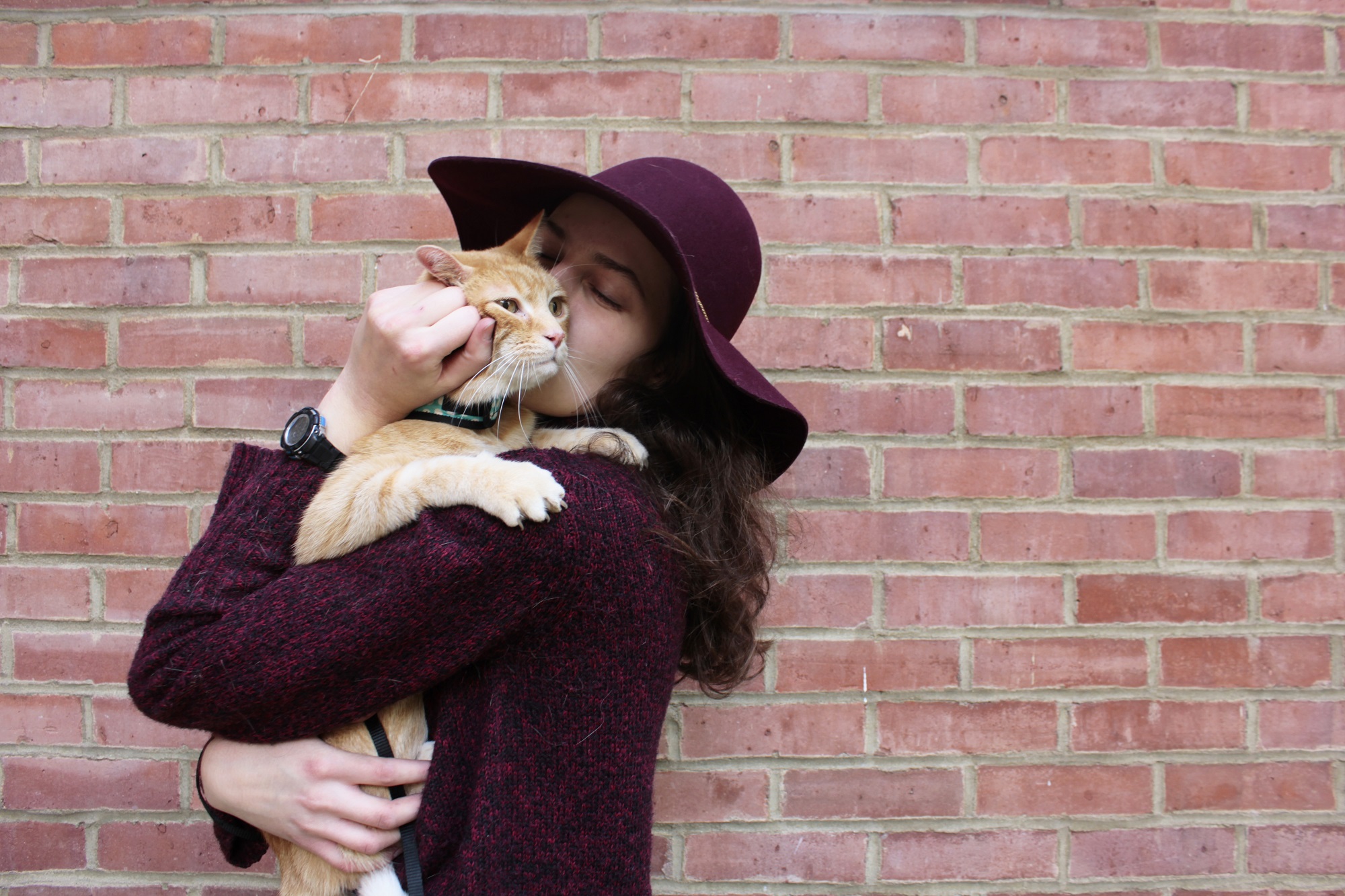Apple Cider Vinegar for Cats: Cat UTI Home Remedy
Last Updated on
Want to skip the talk and go straight to the remedy? Click here.
Disclaimer: Some of the products recommended in this post have affiliate links. If you make a purchase through these links, we’ll receive a small commission, but it won’t cost you any extra. Thank you!
When you’re desperate for something that will save your cat from a potentially deadly urethral blockage, apple cider vinegar is one home remedy that might actually help. For hundreds of years, apple cider vinegar has been a popular home remedy for UTI and other feline lower urinary tract diseases. It’s safe, healthy, and after reading hundreds of accounts from people who have treated their cat’s feline lower urinary tract disease (FLUTD) with ACV, I’m convinced that it’s a remedy worth trying. In fact, during my cat’s two bouts with FLUTD, apple cider vinegar was our go-to treatment.
In this article, we’ll be exploring the symptoms of this disease, why people think that apple cider vinegar can help your cat and methods for administering this treatment.
Disclaimer: We are not veterinarians. If your cat is suffering from urinary issues, please consult a veterinarian and get them treated. Feline lower urinary tract disease is serious and requires immediate attention. It is difficult to accurately diagnose your cat at home. This article is based on our experience and research and is intended as a resource for those looking to supplement treatment in stable cats.
About feline lower urinary tract disease (FLUTD).
Feline lower urinary tract disease is a blanket term covering an array of different diseases affecting the lower urinary tract in cats. More specifically, this can refer to bacterial urinary tract infections, struvite or calcium oxalate crystals, mucus blockages, and other issues that can cause your cat difficulty in passing urine. Most cases of FLUTD are considered idiopathic—no specific cause is identified. These diseases affect an estimated 1-3% of cats each year. Urinary issues are particularly common among young, neutered male cats. Male cats have a smaller urethra and thus a physical tendency to get blocked up.
When your cat has a urinary tract problem, it becomes difficult and often painful for them to urinate. If the case is severe, they will not be able to pass any urine at all. A blockage is a terrifying situation. I know from personal experience how frightening it is to see your cat incapable of passing urine.
That fear is well-placed. If a cat is fully blocked, without appropriate treatment, it’s only a matter of time before that blockage leads to death.
How will I know my cat has a urinary tract disease?
The thing that’s scary about FLUTD is that it can show up very quickly and needs to be treated immediately. When this happens, toxins will build up in the cat’s body fast. The kidneys are no longer filtering them out of the cat’s system. If your cat isn’t treated, they can die within 24 hours. Some of the first symptoms are urinating outside of the litter box, straining to urinate, blood in the urine, excessive licking of the genitals, and crying in the litter box.
Can apple cider vinegar help treat FLUTD?
For now, the jury is still out on this question.
Apple cider vinegar for cats has a significant track record as a home remedy for feline UTI and other cat urinary tract health issues. A quick internet search will reveal scores of people singing the praises of apple cider vinegar after it apparently cured their cat of FLUTD. There’s something going on here and it’s worth investigating further. If apple cider vinegar can treat urinary tract disease, this would be a life-saving home remedy that we should all know about. If it’s not, the claims circulating about apple cider vinegar as urinary tract panacea are nothing but dangerous.
So let’s look at this more deeply.
Based on my research, experience, and reasoning, the answer is that yes, it can help—but only for specific types of FLUTD.
It’s absolutely not a cure-all.
The problem with apple cider vinegar is that it doesn’t treat all forms of FLUTD.
The theory is that in the case of a true bacterial infection, the acidity of ACV may be able to create an unfriendly environment for that bacteria. This is a fair theory. Many of us have used vinegar as a mild disinfectant and know that it can be used as an antibacterial cleaner. It makes sense that theoretically, ingesting mildly acidic vinegar could help to kill bacteria in the urinary tract. What’s more, raw apple cider vinegar is a prebiotic—it encourages healthy bacteria production, which could encourage good bacteria to overtake the bad bacteria that’s created the infection. And on the same note, alkaline struvite crystals can also be theoretically eliminated by feeding your cat doses of apple cider vinegar. We’re balancing out the alkalinity of the urinary tract. It’s important to recognize, though, that without taking your cat to a veterinarian, it’s virtually impossible to know what is causing your cat’s urinary tract issues.
Remember, though, that not enough research has been done to determine exactly how apple cider vinegar helps to treat FLUTD. We don’t know if raw, unfiltered apple cider vinegar is the only way to go or if filtered apple cider vinegar works just as well. Proponents of this home remedy claim that the nutrients and minerals in raw, unfiltered ACV give it a “healing touch”—but how, exactly, does it work?
Again, a lot more research needs to be done on this home remedy.
Here’s a promising statistic from VetInfo:
“In a study performed by a holistic website, 43 cat owners were polled. All of them had cats displaying the signs of a urinary tract infection. Of those 43 people, 41 reported their cat’s health improved to the point of being back to normal. One found no marked improvement and the final pet owner said the cat was improved but not fully treated.”
Whether these cats would have recovered without treatment or if the apple cider vinegar actually helped is unclear. These cats were not diagnosed with a specific disease, so we don’t really know if they had urinary tract infections or crystals. Recovery was subjective and recurrence wasn’t recorded. But those statistics are compelling.
On Earthclinic, the personal experiences with apple cider vinegar as a treatment for idiopathic cystitis (inflammation of the bladder) are also promising. As of August 4th, 2017, 72 out of 87 reviews of this home remedy give 5-star ratings.
Here are a few quotes from the remedy review section:
“I have never imagined that I would resort to this BUT after 2 vet visits and same problem recurring systemically, I decided to give ACV a go. I used a dropper as my finicky Ragdoll would not eat or drink anything tainted with ACV. I used 1/4 ts to 1 water ratio and gave it to her 3 times daily for a week. Doesn’t work overnight so patience is needed! … She has started to use her box after 3 days into treatment. … I am all for natural medicine for humans, now I know I can seek alternatives for my beloved pets as well! Thank you all for sharing your experiences! While skeptical at first, I am a believer! I’m extremely grateful!” – Miasmom
“I took my cat stewy into the vet after a night of him crying and saw blood in his pee in odd spots in the house. They looked at him gave him antibiotics and said he prob has a uti. I could not afford them to do more tests. It was nearly 200 dollars for that visit. Now we got home and a week later he was peeing blood again. So I tried apple cider vinegar and in a week he was better again. This morning crying non stop and he peed blood again. I had been putting it in his food switched over a week ago to wet food and pouring a tablespoon in his food and they eat it all always. I have tried to do a syringe and put it in his mouth and he spits it out and drools all over his face. I can not afford to take him back to the vet. Any suggestions to fix him would be greatly appreciated.” – Rachel
“I can’t tell you how grateful I am for your advice. Mischief was in agony but in one day he was so much better thanks to Apple Cider Vinegar. I made parsley tea (recommended by homeopathic vet), a few drops of Rescue Remedy and a little ACV. Mischief did not mind me squirting it into his mouth. He is now off conventional “vet recommended” dry food and I give him cooked chicken and livers and once a week fish. None of my animals will take raw food. I add in a bit of coconut oil. No more dry food as this all started when his teeth hurt him also from eating this poison. Thank you so very much. Best wishes, Ginny” – Ginny
Clearly, something is going on. There is tons of anecdotal evidence that apple cider vinegar can help to treat FLUTD, and for a desperate cat guardian watching their cat suffer, it’s enough to justify giving this remedy a try. We don’t know for certain when or how apple cider vinegar helps cats, but we do know that it won’t hurt to try it.
How do I give my cat apple cider vinegar?
When your cat is suffering from a urinary tract disease, we suggest that you give your cat 1-3 teaspoons of apple cider vinegar with 1/4 cup water. Administer a teaspoon or so every hour. To do this, you can incorporate the apple cider vinegar into your cat’s food. If that doesn’t work, you may also use a syringe. Your cat might not like the taste, but it is completely safe for them to eat.
Most successful users of apple cider vinegar for cats notice a difference in urinary tract health within the next day.
Can I use ACV as a preventative treatment for my cat?
Once your cat gets better, you may incorporate a capful of apple cider vinegar into your cat’s food daily to keep their systems healthy. It’s the same principle behind conventional urinary tract health food: this keeps your cat’s pH slightly lower, which is helpful for cats who are predisposed to alkaline crystals. But frankly, I don’t believe that’s the best route to preventing the recurrence of FLUTD.
Nutrition is the best preventative medicine.
There’s a possibility that apple cider vinegar can help your cat to recover from FLUTD and there’s a chance that maintaining a healthy urinary tract pH can prevent a recurrence. But if you really want to keep your cat’s urinary tract healthy, look at their diet. Dry food is the urinary tract’s worst enemy. This is because cats often are unwilling to drink water on their own. If your cat isn’t chugging water all day long, it’s not going to be enough to compensate for the low water content of their dry food.
Switch out your dry food for a nutritious canned wet food or to go raw. Take a look at this video to hear my story about dry food, my cat’s urinary tract disease, and how switching from dry to wet changed his life.
Need more information on why dry food causes feline urinary tract disease? Give this a read: Dry Cat Food and Feline UTI – Is Dry Food Bad For My Cat?
Dry food is never worth making your cat unhealthy.
What is the best cat food for urinary health?
Remember, moisture is the key to long-term urinary tract health. A high-moisture, biologically appropriate diet is one of the best things you can offer to keep your cat healthy. Choose low-carbohydrate, meat-based canned foods, or a nutritionally balanced homemade or commercial raw food.
Take a look at our guide to the 6 Best Cat Foods for Urinary Tract Health.
Quick heads up—we are in an affiliate program with the next cat food I’m about to mention, so if you buy it through our links, we will get a percentage from the sale. You’ll also be supporting us so we can bring you more content and information. Thank you!
If you’re looking for high-quality moist cat food with homemade freshness and quality but doesn’t require any effort to prepare, try NomNomNow cat food (click the link for our personal review of NomNomNow). NomNomNow cat food is made with human-quality ingredients and is made fresh to order in their San Francisco and Nashville kitchens. The food’s quality and moisture content make it great for cats with urinary issues.
NomNomNow cat food is available through a personalized subscription, or, if you’re not sure your cat will like the food, you can get a six pouch variety pack. If you’d like to purchase a NomNomNow cat food subscription, click here to get 30% off your cat food quote.
Did you find this home remedy useful? Pin it for later!











